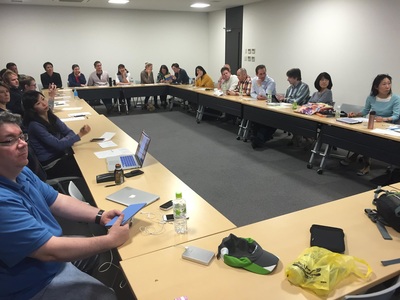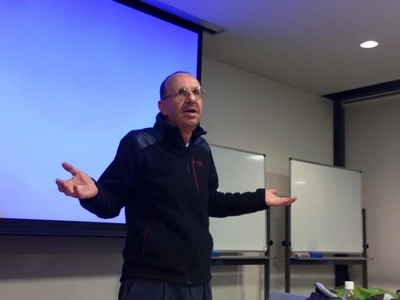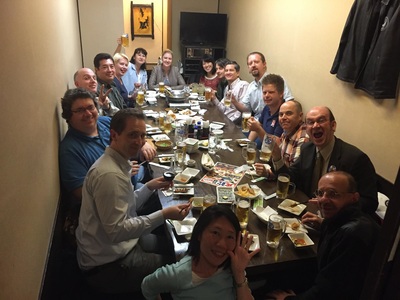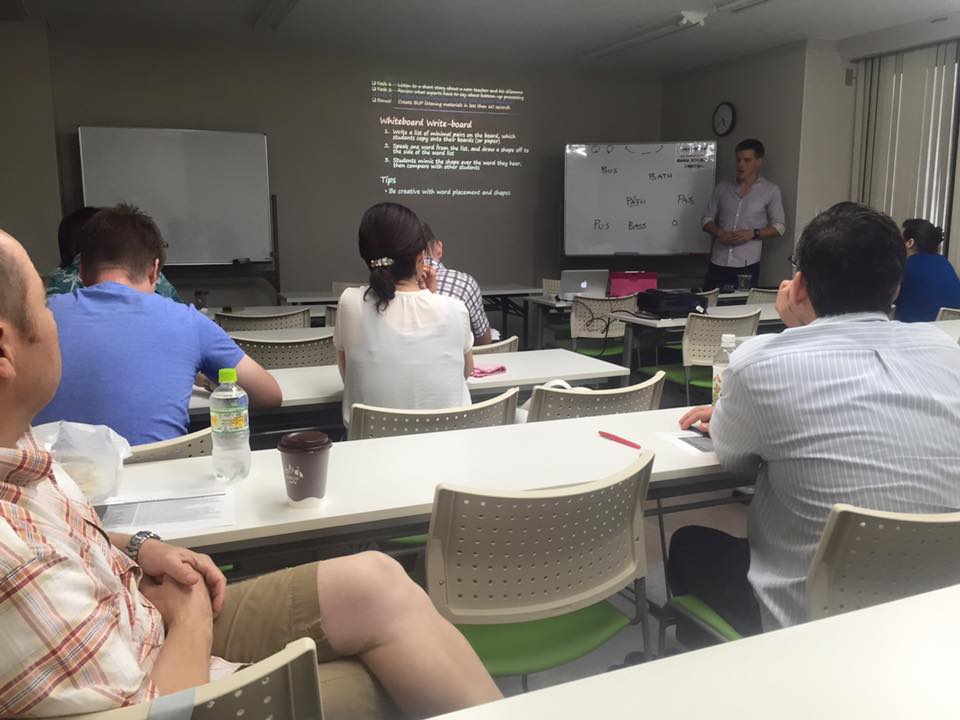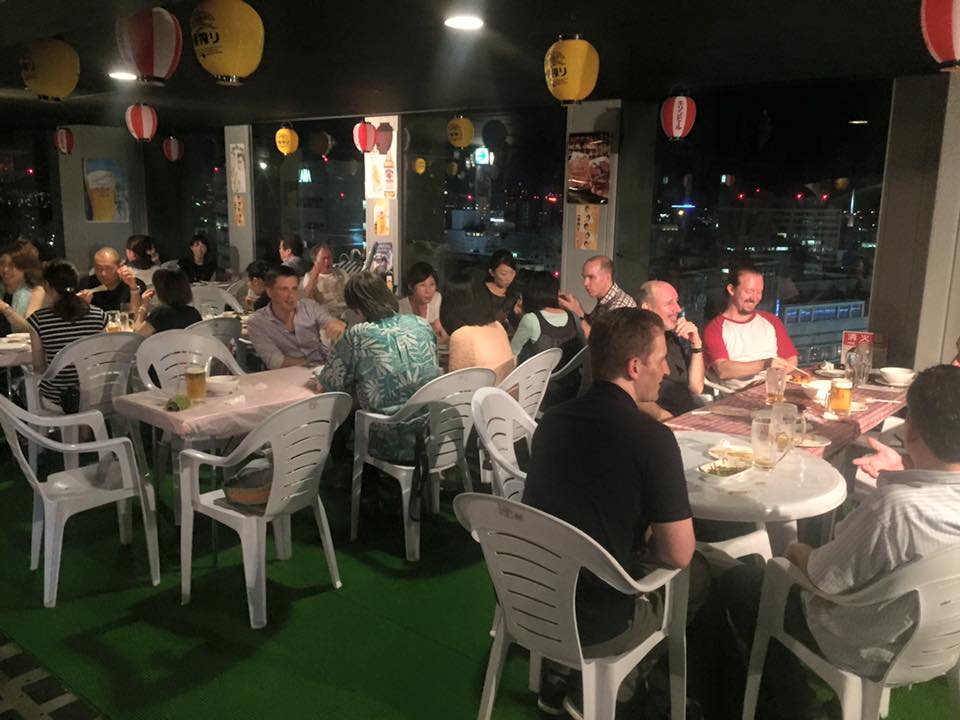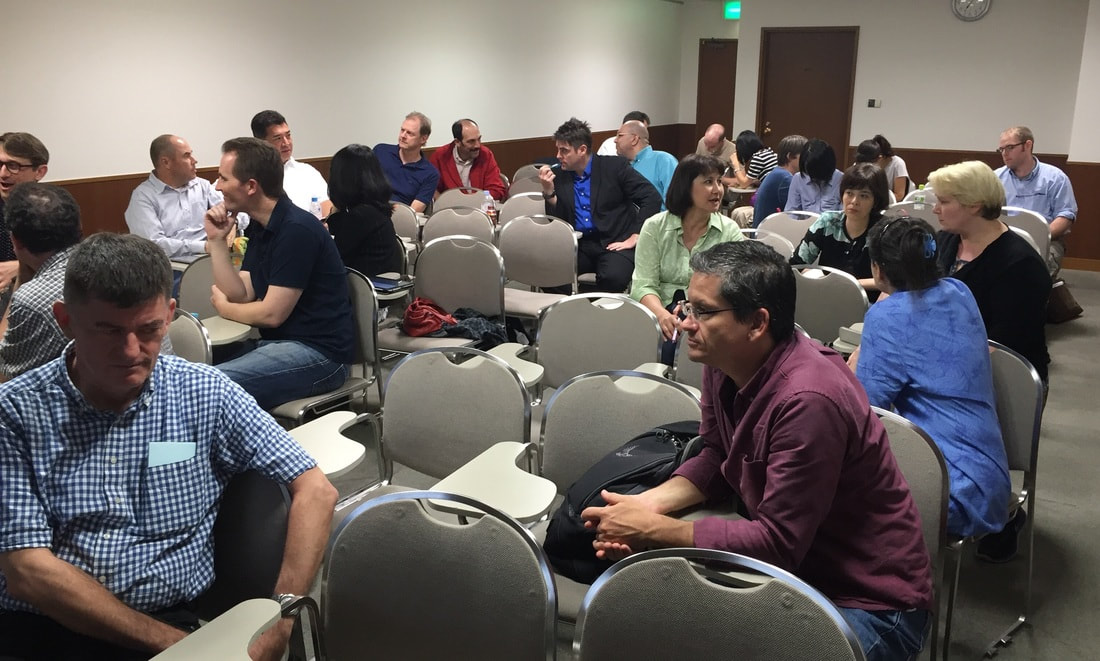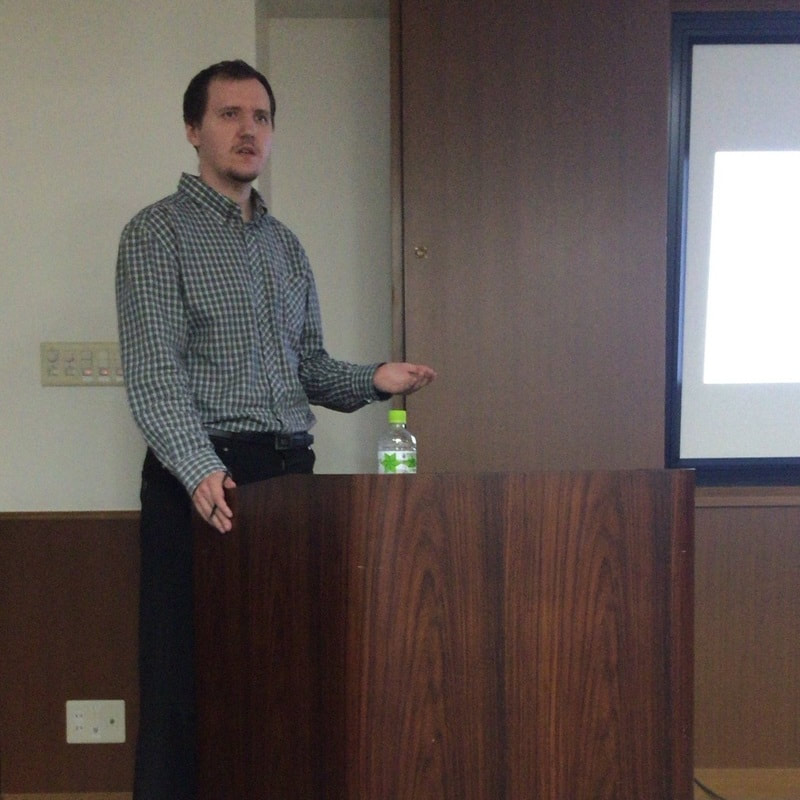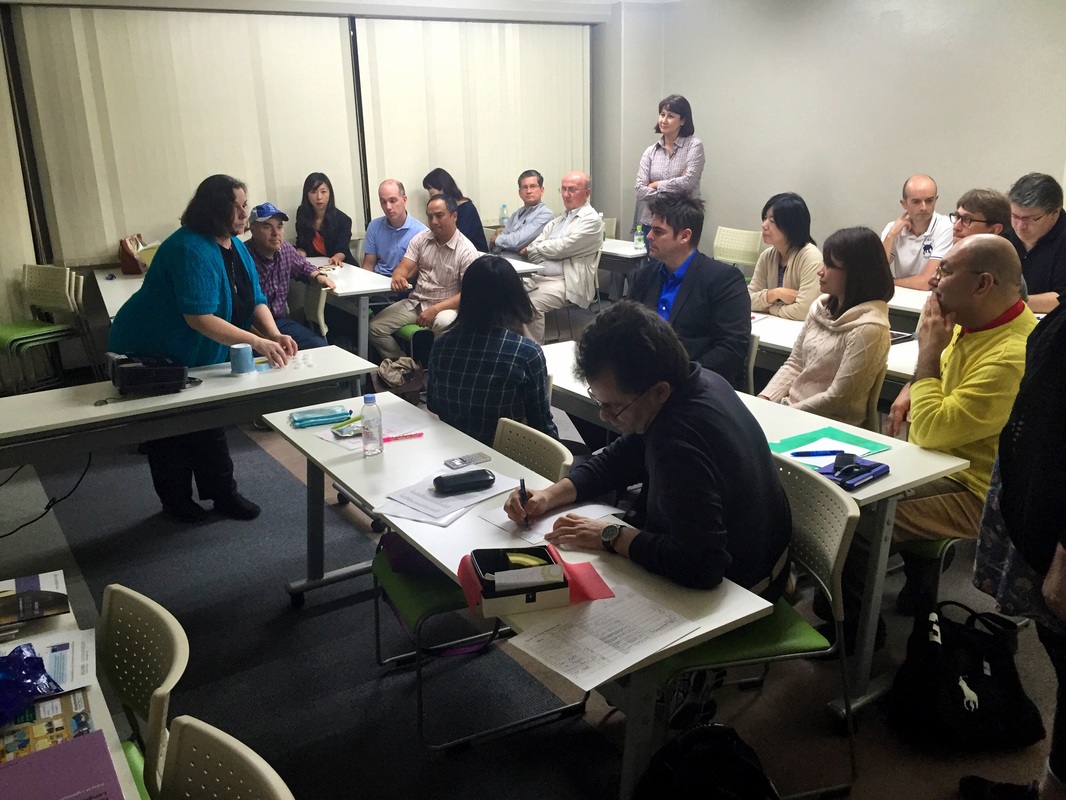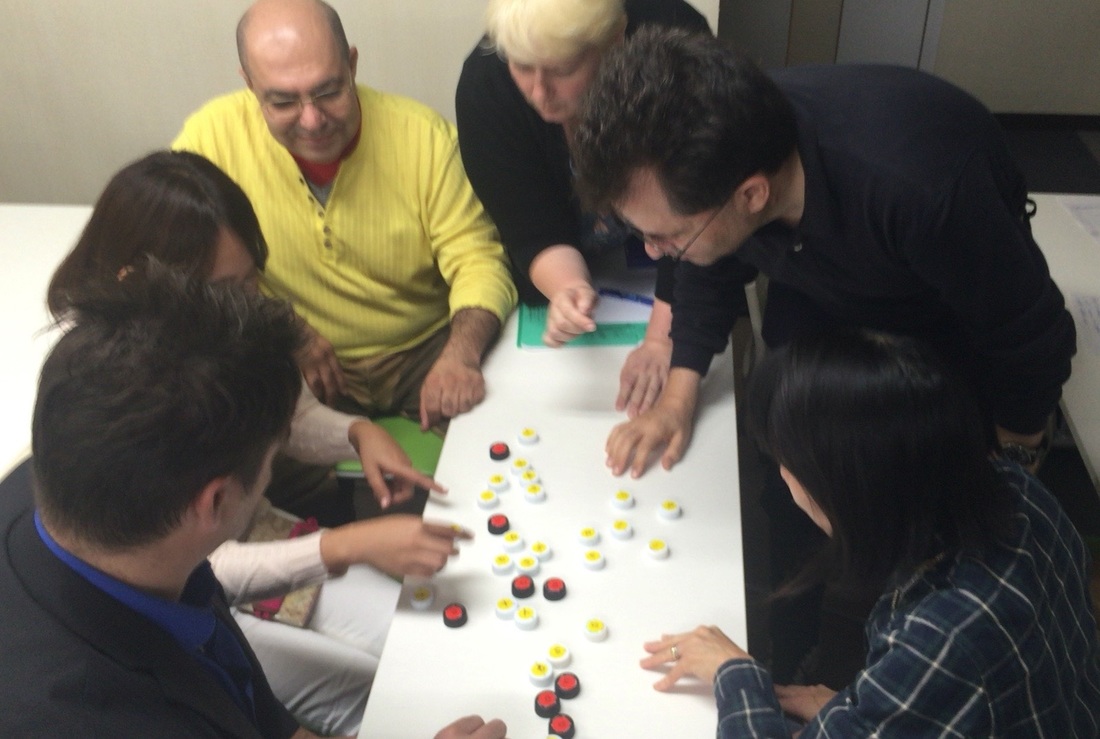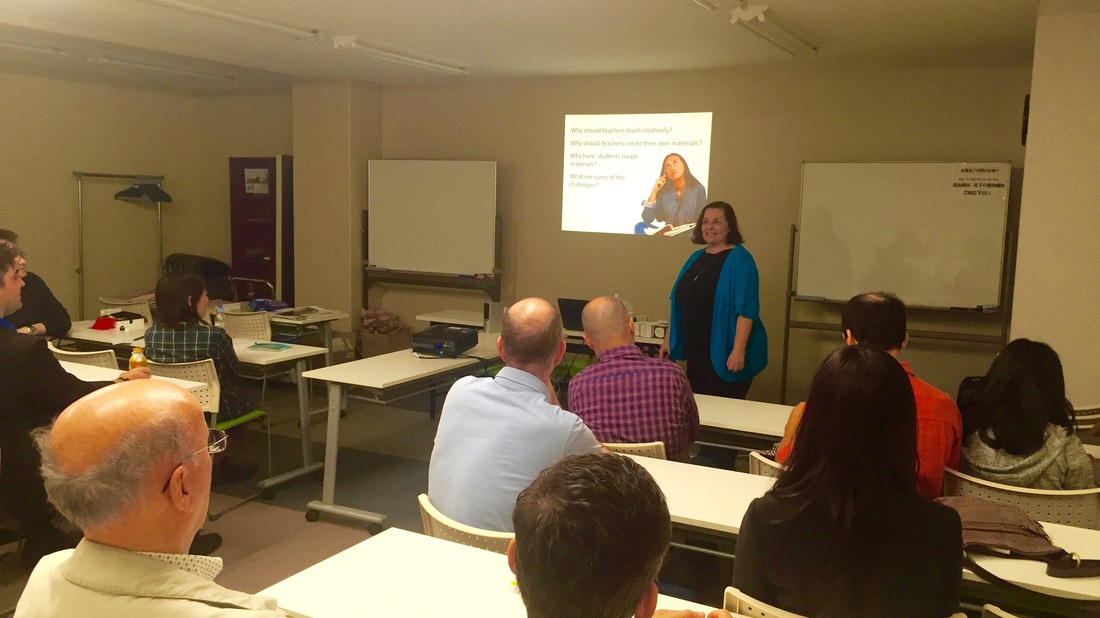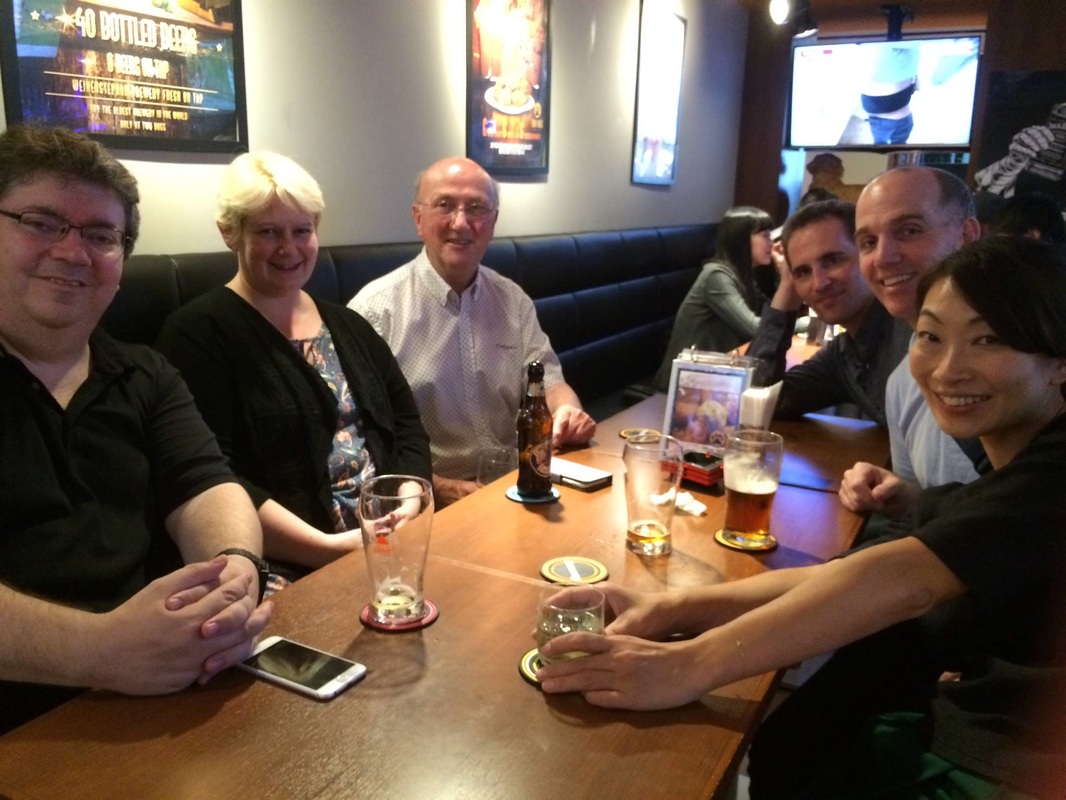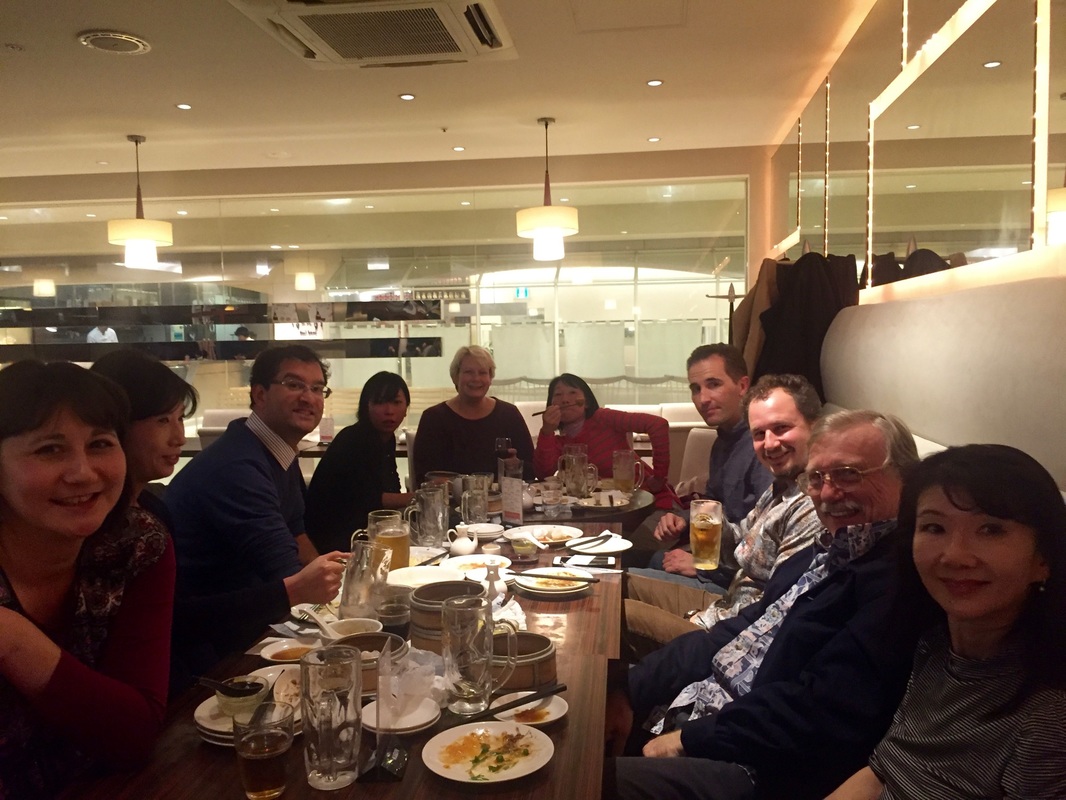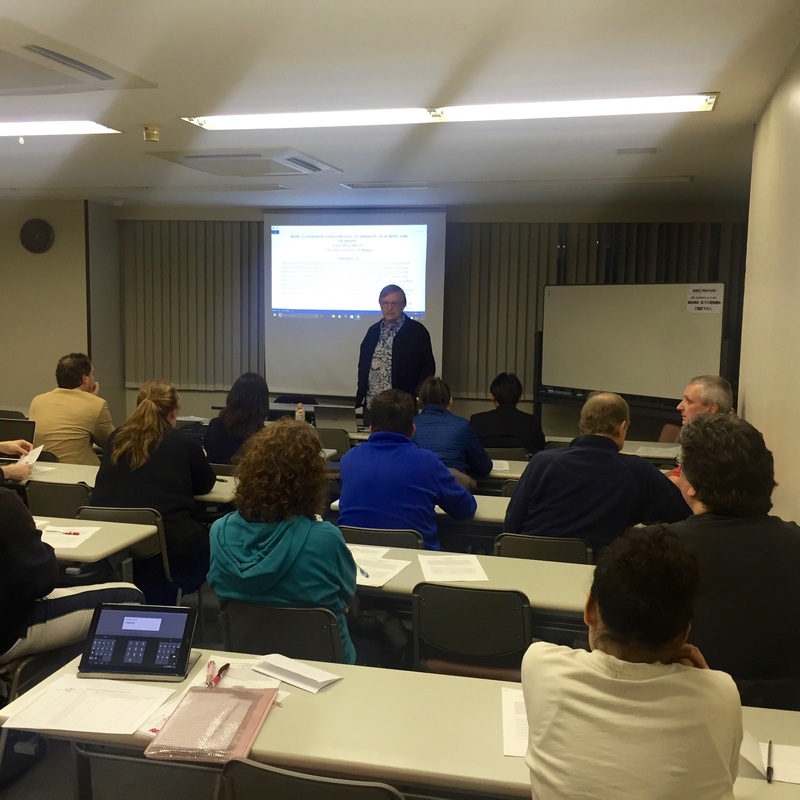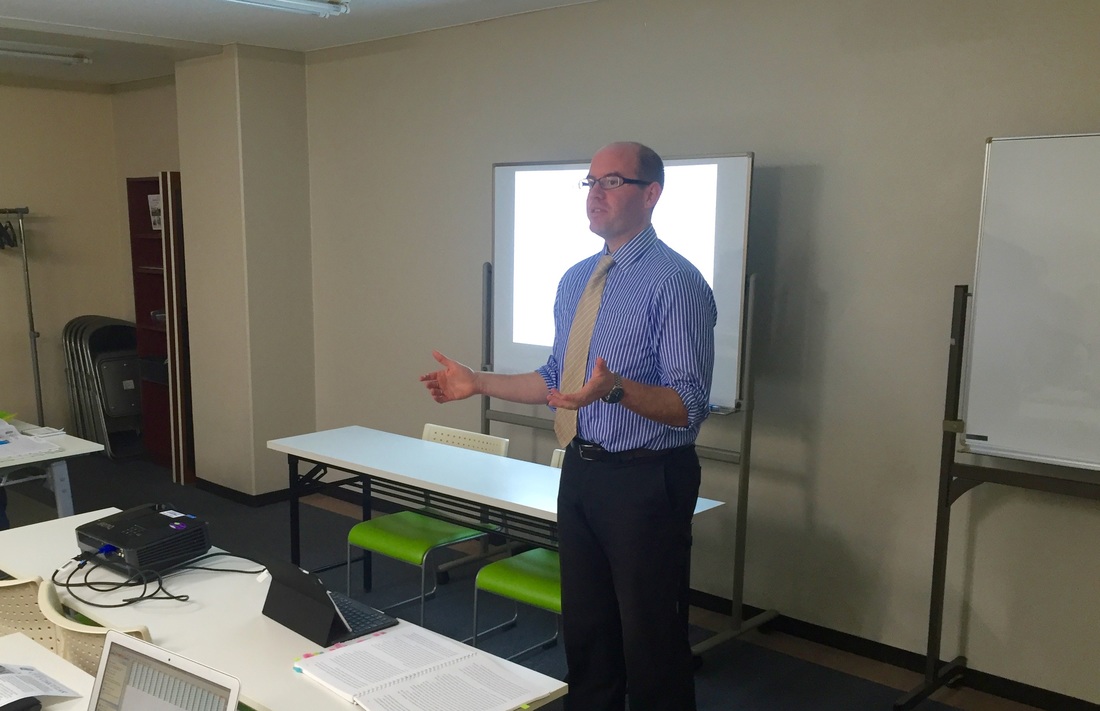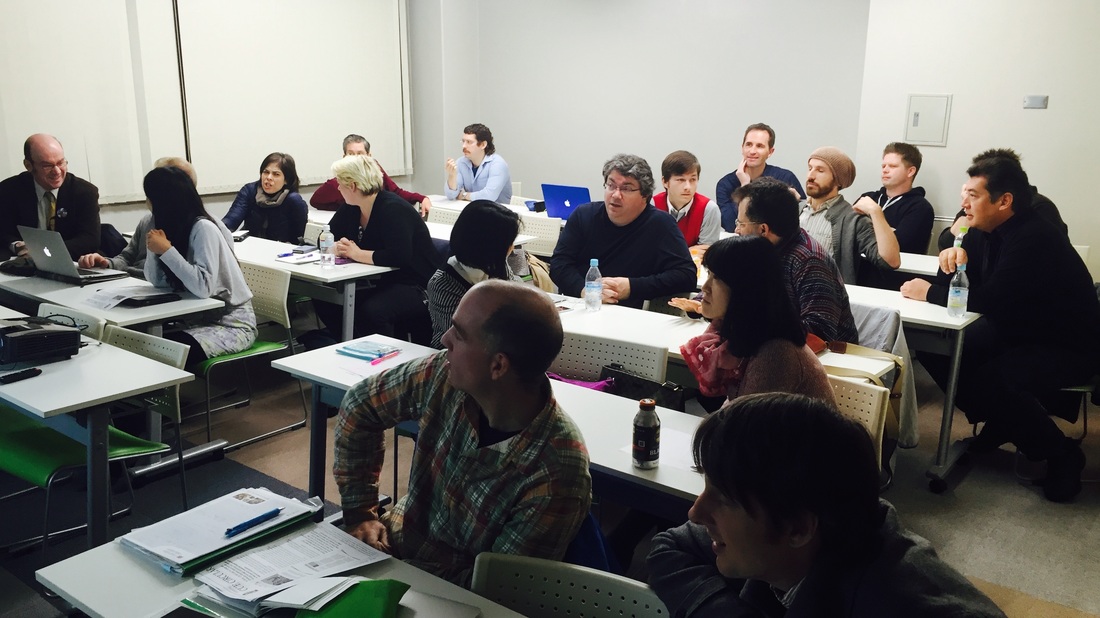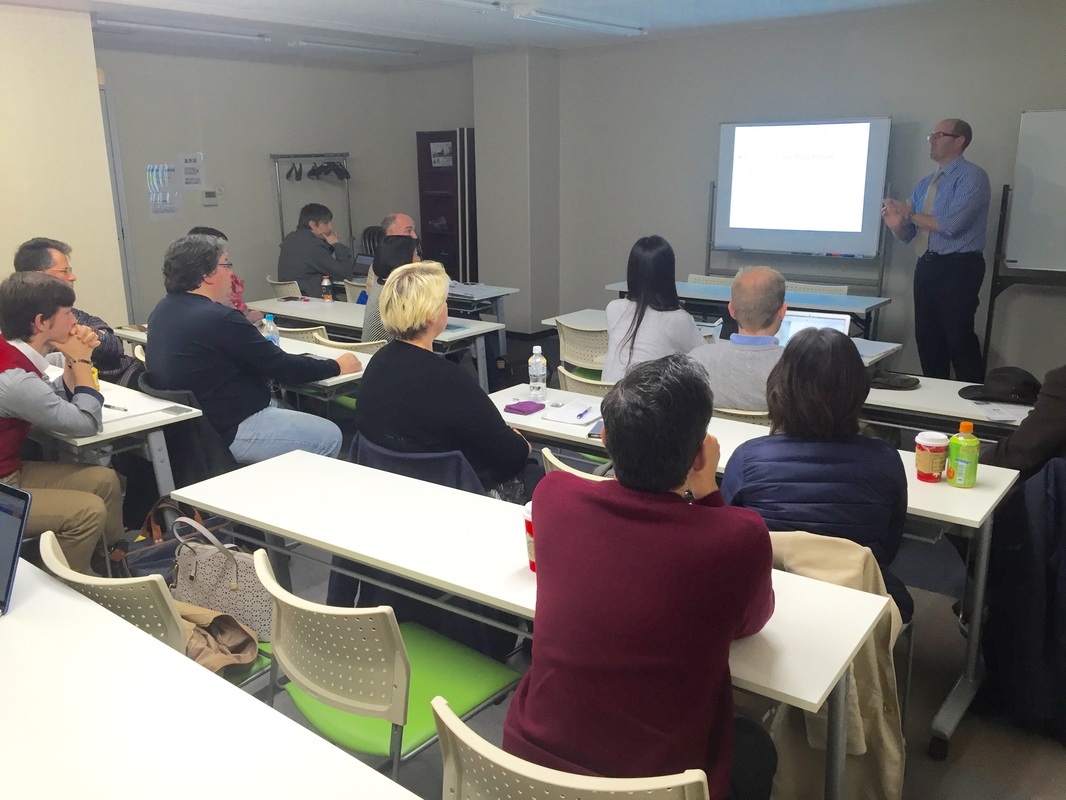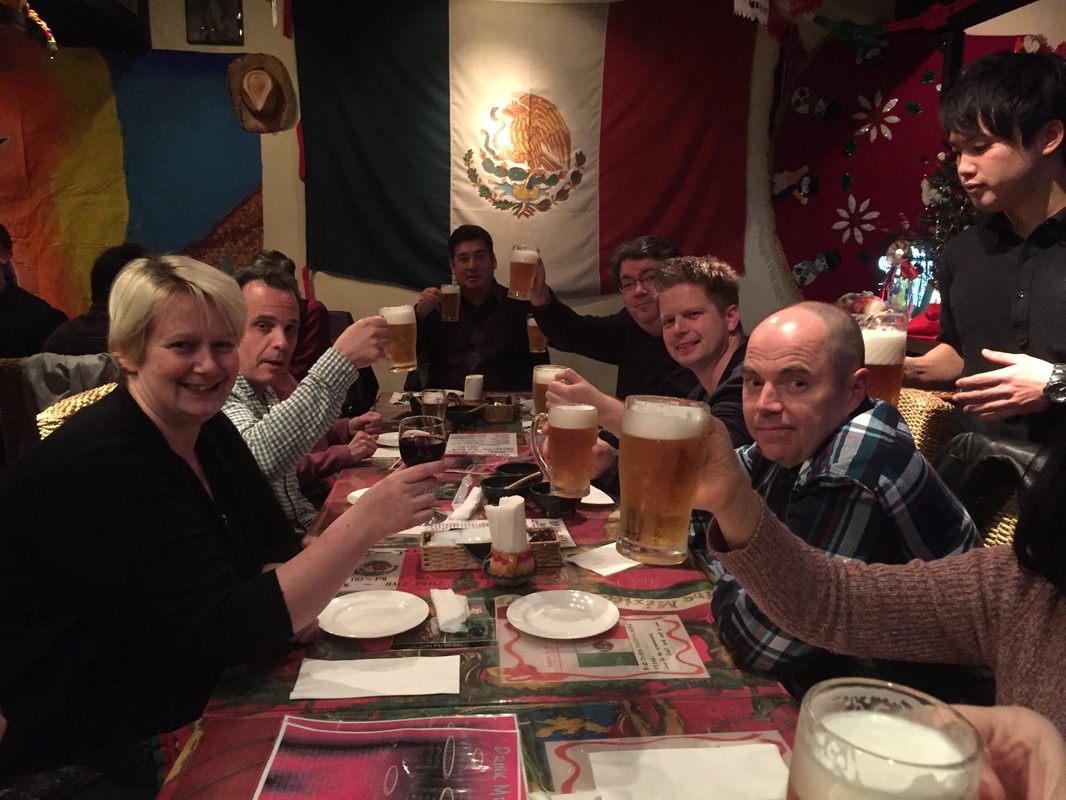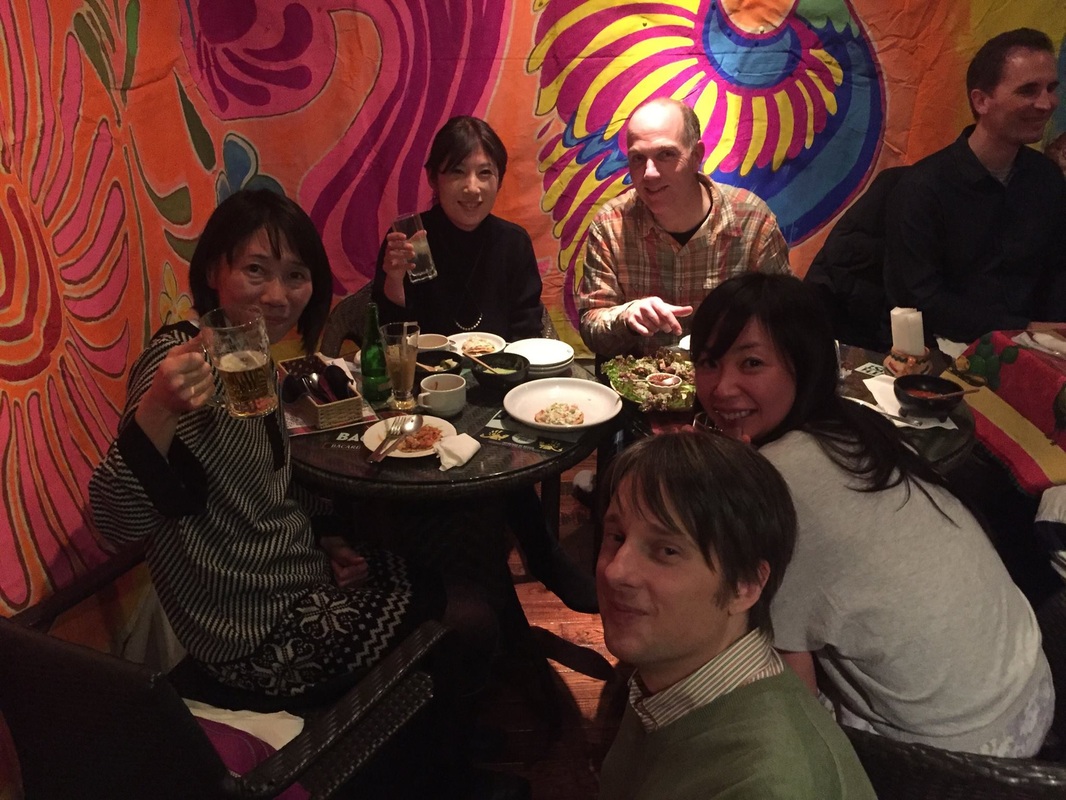April 2015 Event
Date: Sat April 25
Time: 18:00 - 20:00
Speaker: Ian Brown (Matsuyama University)
Title: "Blended Learning with Student Smartphones and iPhones"
Location: Seinan Gakuin University Community Center 2F (map)
After-meeting social event:
Venue: Wara Wara (Nishijin Ekimae-ten)
"Blended Learning with Student Smartphones and iPhones"
Blended-learning, the mix of face-to-face teaching and CALL, has grown in popularity with the rise of CALL and computers. However one impediment has always been the need for computers and computer labs. Now with the spread of smartphones and iPhones reaching saturation point, students have effectively powerful Internet connected computers in their pockets, ideal for blended learning in any classroom. With students these days having more access and familiarity with mobiles over computers, Mobile Assisted Language Learning (MALL) is rapidly developing, even overtaking computers in language learning. This workshop presentation will demonstrate some of the ways to use students' mobile devices in the language classroom. The mobile phone use is centred around class 'Home' sites, mobile friendly LMSs, containing class information and links to online activities. The presentation will demonstrate the setup of such a home site and then show how class information, and some activities such as tests, audio links, discussion boards and voice recording of presentations or dialogues can be used in the classroom through the smartphones and iPhones. The mobile device use supplements the face-to-face teaching in a blended learning approach and can be used in conjunction with any regular textbook. It is only used when technology has advantages in language learning over traditional methods and these advantages will be highlighted and demonstrated in the presentation. Rather than being the distraction to learning in the classroom that disturb teachers, students' smartphones and iPhones can be a boon to learning!
Time: 18:00 - 20:00
Speaker: Ian Brown (Matsuyama University)
Title: "Blended Learning with Student Smartphones and iPhones"
Location: Seinan Gakuin University Community Center 2F (map)
After-meeting social event:
Venue: Wara Wara (Nishijin Ekimae-ten)
"Blended Learning with Student Smartphones and iPhones"
Blended-learning, the mix of face-to-face teaching and CALL, has grown in popularity with the rise of CALL and computers. However one impediment has always been the need for computers and computer labs. Now with the spread of smartphones and iPhones reaching saturation point, students have effectively powerful Internet connected computers in their pockets, ideal for blended learning in any classroom. With students these days having more access and familiarity with mobiles over computers, Mobile Assisted Language Learning (MALL) is rapidly developing, even overtaking computers in language learning. This workshop presentation will demonstrate some of the ways to use students' mobile devices in the language classroom. The mobile phone use is centred around class 'Home' sites, mobile friendly LMSs, containing class information and links to online activities. The presentation will demonstrate the setup of such a home site and then show how class information, and some activities such as tests, audio links, discussion boards and voice recording of presentations or dialogues can be used in the classroom through the smartphones and iPhones. The mobile device use supplements the face-to-face teaching in a blended learning approach and can be used in conjunction with any regular textbook. It is only used when technology has advantages in language learning over traditional methods and these advantages will be highlighted and demonstrated in the presentation. Rather than being the distraction to learning in the classroom that disturb teachers, students' smartphones and iPhones can be a boon to learning!
May 2015 event
Date: Sat May 23
Speaker: Jon Dujmovich
Title: "Multicultural Me: Expanding horizons for intercultural communication"
Location: Seinan Gakuin University Community Center 2F (map)
After-meeting social event:
Venue: D.Khajana, Fujisaki
"Multicultural Me: Expanding horizons for intercultural communication"
Utilized in various settings for adults & university students, down to J.H.S. 3rd grade students, the activities and program within Multicultural Me provides students with an opportunity to develop intercultural and second language competency, in a manner specifically tailored to the challenges of the Japanese context.
The Multicultural Me module for intercultural communication blends task-based learning (TBL) and content-based approaches for language learners. The central aims of the module are: To deepen cultural self-realization; broaden awareness of social diversity in daily life; develop and express empathy; enable learners to open multiple channels for communication; and provide a language framework for expressing one’s identity as well as showing interest in others.
In this workshop the presenter will demonstrate and discuss the Multicultural Me activities, grounding in intercultural communication theory, methodology, and ESL pedagogy. The presenter will provide opportunities to experiment with ideas and activities in a workshop format while demonstrating how activities can be adjusted for learning stage appropriateness. Participants will be able to incorporate the ideas and activities from this workshop into their classes, and immediately apply them to their lessons.
Date: Sat May 23
Speaker: Jon Dujmovich
Title: "Multicultural Me: Expanding horizons for intercultural communication"
Location: Seinan Gakuin University Community Center 2F (map)
After-meeting social event:
Venue: D.Khajana, Fujisaki
"Multicultural Me: Expanding horizons for intercultural communication"
Utilized in various settings for adults & university students, down to J.H.S. 3rd grade students, the activities and program within Multicultural Me provides students with an opportunity to develop intercultural and second language competency, in a manner specifically tailored to the challenges of the Japanese context.
The Multicultural Me module for intercultural communication blends task-based learning (TBL) and content-based approaches for language learners. The central aims of the module are: To deepen cultural self-realization; broaden awareness of social diversity in daily life; develop and express empathy; enable learners to open multiple channels for communication; and provide a language framework for expressing one’s identity as well as showing interest in others.
In this workshop the presenter will demonstrate and discuss the Multicultural Me activities, grounding in intercultural communication theory, methodology, and ESL pedagogy. The presenter will provide opportunities to experiment with ideas and activities in a workshop format while demonstrating how activities can be adjusted for learning stage appropriateness. Participants will be able to incorporate the ideas and activities from this workshop into their classes, and immediately apply them to their lessons.
July 2015 event
Date: Saturday, July 11th, 2015
Speaker: Branden Kirchmeyer (Sojo University)
Title: Done in 60 Seconds: Bottom-up listening tasks for beginners
Location: NEW LOCATION- Office Humming Bird
(in Tenjin on Showa Dori, between Oyafuku-dori and Futata; map
"Done in 60 Seconds: Bottom-up listening tasks for beginners"
Geared towards teachers with beginner-level or reluctant students, this interactive presentation focuses on the integration of brief but frequent bottom-up processing (BUP) activities into larger, more meaning-focused instruction. Twenty-four activities will be demonstrated, each of which serve to promote BUP skills, reinforce target language needed for more communicative tasks, and/or increase learner engagement. CALL tie-ins will also be discussed, and experimental online (Moodle) BUP tasks currently under development for an upcoming research project will be shown. Attendees will be invited to participate as students, and to share any relevant experiences which may contribute to the conversation.
The July event will be followed by our Annual Beer Garden event.
Speaker: Branden Kirchmeyer (Sojo University)
Title: Done in 60 Seconds: Bottom-up listening tasks for beginners
Location: NEW LOCATION- Office Humming Bird
(in Tenjin on Showa Dori, between Oyafuku-dori and Futata; map
"Done in 60 Seconds: Bottom-up listening tasks for beginners"
Geared towards teachers with beginner-level or reluctant students, this interactive presentation focuses on the integration of brief but frequent bottom-up processing (BUP) activities into larger, more meaning-focused instruction. Twenty-four activities will be demonstrated, each of which serve to promote BUP skills, reinforce target language needed for more communicative tasks, and/or increase learner engagement. CALL tie-ins will also be discussed, and experimental online (Moodle) BUP tasks currently under development for an upcoming research project will be shown. Attendees will be invited to participate as students, and to share any relevant experiences which may contribute to the conversation.
The July event will be followed by our Annual Beer Garden event.
September 2015 event
Date: September 26th (Saturday)
Speaker: Alexey Kukharuk
Title: Obstacles to professional development in Japanese schools and universities
After-meeting social event:
Venue: GRAND CHINA (Chinese buffet)
福岡市中央区天神1‐1‐1アクロス福岡B2F
ACROS Fukuoka B2F, 1-1-1, Tenjin, Chuo-ku, Fukuoka
Speaker: Alexey Kukharuk
Title: Obstacles to professional development in Japanese schools and universities
After-meeting social event:
Venue: GRAND CHINA (Chinese buffet)
福岡市中央区天神1‐1‐1アクロス福岡B2F
ACROS Fukuoka B2F, 1-1-1, Tenjin, Chuo-ku, Fukuoka
Obstacles to professional development in Japanese schools and universities
With professional development (Faculty Development) finally reaching tertiary institutions and the focus of education shifting from teaching to learning, Japanese schools and universities face several difficulties regarding the implementation of effective professional development programs. This presentation is part of a larger study, undertaken by the presenter during the post-graduate course at the University of Manchester, which explored obstacles to professional development (Faculty Development) at a Japanese national university.
This presentation is a literature review which introduces several challenges for professional development in Japan. Namely, the presentation discusses attitudes to teaching among school and university educators and problematizes the concept of “good teaching” as a standard for teaching. The second half of the presentation introduces what are observed to be common attitudes to professional development in schools and universities and elaborates on the related to those attitudes concept of reflection.
The presentation includes group activities in which the participants will be able to share their experience with and views on some of the above-mentioned points. It will conclude with the implications of the discussed issues for professional development of teachers in Japan – both in the view of the presenter and those of the participants.
Bio
Alexey Kukharuk works as an English instructor and a facilitator at Fukuoka Communication Center where in addition to teaching, his responsibilities include but are not limited to interviewing job applicants and managing the professional development of both new and current instructors. The author’s primary research interests lie in professional development and teacher learning as well as education quality.
With professional development (Faculty Development) finally reaching tertiary institutions and the focus of education shifting from teaching to learning, Japanese schools and universities face several difficulties regarding the implementation of effective professional development programs. This presentation is part of a larger study, undertaken by the presenter during the post-graduate course at the University of Manchester, which explored obstacles to professional development (Faculty Development) at a Japanese national university.
This presentation is a literature review which introduces several challenges for professional development in Japan. Namely, the presentation discusses attitudes to teaching among school and university educators and problematizes the concept of “good teaching” as a standard for teaching. The second half of the presentation introduces what are observed to be common attitudes to professional development in schools and universities and elaborates on the related to those attitudes concept of reflection.
The presentation includes group activities in which the participants will be able to share their experience with and views on some of the above-mentioned points. It will conclude with the implications of the discussed issues for professional development of teachers in Japan – both in the view of the presenter and those of the participants.
Bio
Alexey Kukharuk works as an English instructor and a facilitator at Fukuoka Communication Center where in addition to teaching, his responsibilities include but are not limited to interviewing job applicants and managing the professional development of both new and current instructors. The author’s primary research interests lie in professional development and teacher learning as well as education quality.
October 17 2015
Speaker: Barbara Sakamoto
Title: Creative Teaching for 21st Century Learners
Speaker: Barbara Sakamoto
Title: Creative Teaching for 21st Century Learners
There's a lot of talk these days about including 21st century skills in language classes. What are these skills, and do they have any place in a language class where teachers have limited contact time, and the priority is, still, to teach English? In this workshop, teachers will learn teaching techniques to help their learners become strong English users and also critical and creative thinkers. By making every moment of class time count, teachers can help students succeed, on exams and in future jobs. Teachers can build both the traditional four skills (speaking, listening, reading, and writing) and the 21st century 4Cs (communication, collaboration, creativity and critical thinking) in every class.
The secret is building a strong English foundation, so that teachers can spend most of your class time using language to develop the more advanced (and more fun!) integrated skills in student-generated projects. We'll explore simple teaching techniques to do this and look at actual student projects. Teachers will have a chance to try out techniques and activities, so come prepared to participate.
After the presentation:
食堂空間 和楽 (Shokudokukan Yawaraku)
Address: 3-3-14 Tenjin, Chuo-ku (2F Hotel Ascent Fukuoka)
The secret is building a strong English foundation, so that teachers can spend most of your class time using language to develop the more advanced (and more fun!) integrated skills in student-generated projects. We'll explore simple teaching techniques to do this and look at actual student projects. Teachers will have a chance to try out techniques and activities, so come prepared to participate.
After the presentation:
食堂空間 和楽 (Shokudokukan Yawaraku)
Address: 3-3-14 Tenjin, Chuo-ku (2F Hotel Ascent Fukuoka)
November 28, 2015 (Saturday)
How Classroom Assessments Can Improve Teaching and Learning
Speaker: James Dean Brown (University of Hawai'i at Mānoa)
This presentation will grapple with the issues involved in using classroom assessments to improve teaching and learning. I will begin with several key questions: What is learning? And, how does assessment relate to learning? I will go on to argue that the key is to link assessment to teaching, classroom activities, and learning, and vice versa. In much more detail, I will show how all of this can be done in five steps: planning assessment (including knowing your options, matching assessment to learning, and promoting learning with assessment); writing items (including creating the best possible items, writing enough items, and checking the items again); compiling the assessments (including organizing the items, creating scoring tools, and proofreading the complete assessment procedure); using the assessments (including planning the administration, giving students feedback, and using the feedback yourself); and improving the assessments (including analyzing the items, checking reliability, and checking validity). I will end by discussing with the audience how they now feel they can best link assessment to teaching, classroom activities, and learning, and vice versa.
James Dean Brown ("JD") is currently Professor of Second Language Studies at the University of Hawai'i at Mānoa. He has spoken and taught in many places ranging from Brazil to Venezuela. He has published numerous articles and books on language testing, curriculum design, research methods, and connected speech. His most recent books are: Developing, using, and analyzing rubrics in language assessment with case studies in Asian and Pacific languages (2012 from NFLRC); New ways in teaching connected speech (2012 from TESOL); New ways of classroom assessment, revised (2013 from TESOL); Practical assessment tools for college Japanese (2013 with K. Kondo-Brown & Tominaga from NFLRC); Mixed methods research for TESOL (2014 from Edinburgh University Press); Cambridge guide to research in language teaching and learning (2015 with C. Coombe from Cambridge University Press); Teaching and assessing EIL in local contexts around the world (2015 with S. L. McKay from Routledge); Developing courses in languages for specific purposes (2015 with J. Trace & T. Hudson from NFLRC); Introducing needs analysis and English for specific purposes (in press 2016 from Routledge); and two others that are currently in the works.
How Classroom Assessments Can Improve Teaching and Learning
Speaker: James Dean Brown (University of Hawai'i at Mānoa)
This presentation will grapple with the issues involved in using classroom assessments to improve teaching and learning. I will begin with several key questions: What is learning? And, how does assessment relate to learning? I will go on to argue that the key is to link assessment to teaching, classroom activities, and learning, and vice versa. In much more detail, I will show how all of this can be done in five steps: planning assessment (including knowing your options, matching assessment to learning, and promoting learning with assessment); writing items (including creating the best possible items, writing enough items, and checking the items again); compiling the assessments (including organizing the items, creating scoring tools, and proofreading the complete assessment procedure); using the assessments (including planning the administration, giving students feedback, and using the feedback yourself); and improving the assessments (including analyzing the items, checking reliability, and checking validity). I will end by discussing with the audience how they now feel they can best link assessment to teaching, classroom activities, and learning, and vice versa.
James Dean Brown ("JD") is currently Professor of Second Language Studies at the University of Hawai'i at Mānoa. He has spoken and taught in many places ranging from Brazil to Venezuela. He has published numerous articles and books on language testing, curriculum design, research methods, and connected speech. His most recent books are: Developing, using, and analyzing rubrics in language assessment with case studies in Asian and Pacific languages (2012 from NFLRC); New ways in teaching connected speech (2012 from TESOL); New ways of classroom assessment, revised (2013 from TESOL); Practical assessment tools for college Japanese (2013 with K. Kondo-Brown & Tominaga from NFLRC); Mixed methods research for TESOL (2014 from Edinburgh University Press); Cambridge guide to research in language teaching and learning (2015 with C. Coombe from Cambridge University Press); Teaching and assessing EIL in local contexts around the world (2015 with S. L. McKay from Routledge); Developing courses in languages for specific purposes (2015 with J. Trace & T. Hudson from NFLRC); Introducing needs analysis and English for specific purposes (in press 2016 from Routledge); and two others that are currently in the works.
December 5, 2015 (Saturday)
Internationalized tertiary education
Speaker: Chris Haswell (Kyushu University)
Venue: Tenjin, Office Hummingbird (Tenjin Nishimo bldg. 6F room 602 - above LAWSON)
This presentation covers recent efforts by MEXT to internationalize Japanese education through the use of English. The current language education policies in Japan mandate over 10 years of English language education. Within this context, the number of international students in Japan is at its highest level ever and projected to continue rising, as universities and other institutions of higher education view foreign enrollment and investment as the answer to falling domestic intake. The policies of MEXT are by no means unique, and these actions are in fact somewhat behind those of their Asian neighbours, but they clearly indicate MEXT’s intention to follow worldwide trends in education and sociolinguistic behaviour.
Set against this backdrop of rapid internationalization of language education and enrollment policies is the globalization of the language being used to facilitate these goals – English has developed far beyond a language controlled by a handful of countries into a global lingua franca, affected by its contexts of use. Models used to describe the language have become outmoded, and an understanding of how the language is used and changed by its users is becoming increasingly important for all stake-holders in the language.
This presentation situates the internationalization of Japanese language education in the global context of English language use development. It is intended to provide both a grounded academic background to the current state of this process and a forum for the exchange of practical ideas to assist students, teachers, and others in the industry with the knowledge they need to make the most of their opportunities in this fast-developing sociolinguistic field.
Presenter:
Chris Haswell has been living and researching in Japan for the last 15 years. He has presented research in Japan, Korea, The Philippines and Cambodia, and published work on the internationalization of language education in Asia and the modeling of English use globally. He is currently working at Kyushu University in Fukuoka.
Internationalized tertiary education
Speaker: Chris Haswell (Kyushu University)
Venue: Tenjin, Office Hummingbird (Tenjin Nishimo bldg. 6F room 602 - above LAWSON)
This presentation covers recent efforts by MEXT to internationalize Japanese education through the use of English. The current language education policies in Japan mandate over 10 years of English language education. Within this context, the number of international students in Japan is at its highest level ever and projected to continue rising, as universities and other institutions of higher education view foreign enrollment and investment as the answer to falling domestic intake. The policies of MEXT are by no means unique, and these actions are in fact somewhat behind those of their Asian neighbours, but they clearly indicate MEXT’s intention to follow worldwide trends in education and sociolinguistic behaviour.
Set against this backdrop of rapid internationalization of language education and enrollment policies is the globalization of the language being used to facilitate these goals – English has developed far beyond a language controlled by a handful of countries into a global lingua franca, affected by its contexts of use. Models used to describe the language have become outmoded, and an understanding of how the language is used and changed by its users is becoming increasingly important for all stake-holders in the language.
This presentation situates the internationalization of Japanese language education in the global context of English language use development. It is intended to provide both a grounded academic background to the current state of this process and a forum for the exchange of practical ideas to assist students, teachers, and others in the industry with the knowledge they need to make the most of their opportunities in this fast-developing sociolinguistic field.
Presenter:
Chris Haswell has been living and researching in Japan for the last 15 years. He has presented research in Japan, Korea, The Philippines and Cambodia, and published work on the internationalization of language education in Asia and the modeling of English use globally. He is currently working at Kyushu University in Fukuoka.
2015 Bonenkai, December 5
at Plaza del Sol in Daimyo
at Plaza del Sol in Daimyo

